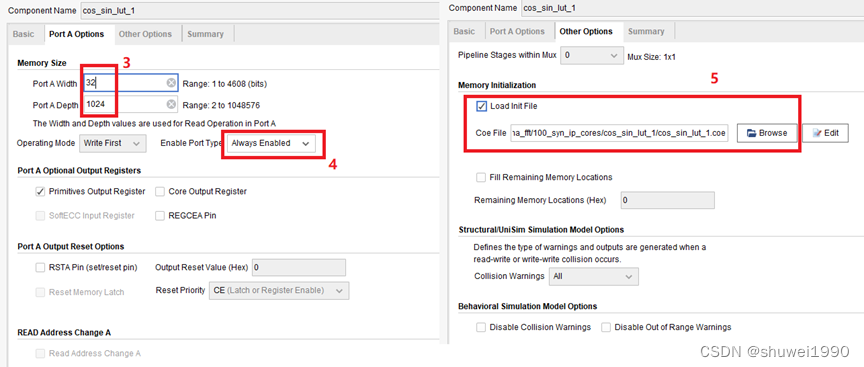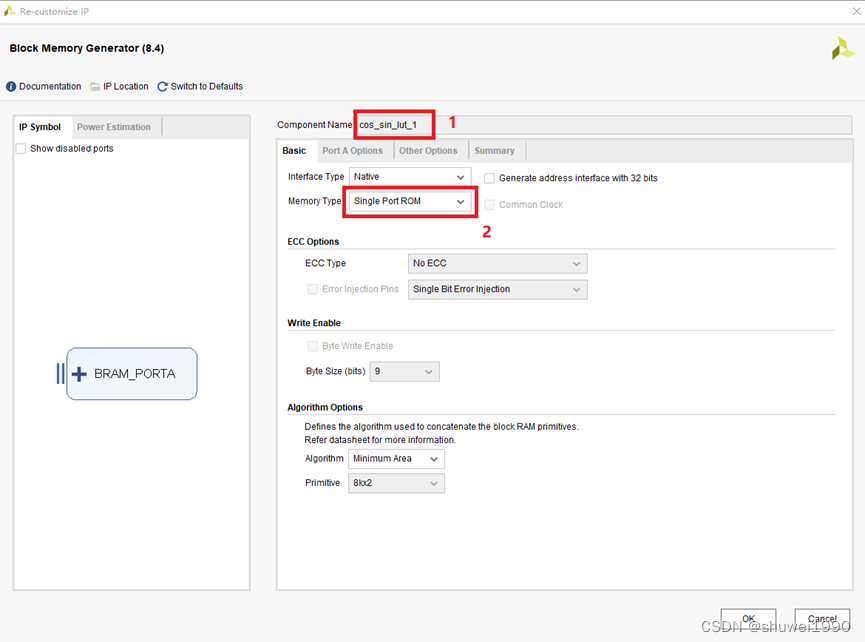一、实现思路
- 使用matlab生成正弦值和余弦值的coe文件;
- 将coe文件写入ROM核中;
- 通过查表得到角度所对应的正弦值和余弦值。
二、实现方法
1、使用matlab生成正弦值和余弦值的coe文件;
%%%%%%%%%%%%%%%%%%%%%%%%%%%%%%%%%%%%%%%%%%%%%%%%%%%%%%%%%%%%%%%%%%%%%%%%%%%%%%%%%%%%%%%%%%%%%%%%%%%%%%%%%
%% Zheng Wei, 2022/12/05
%%
%% 输入角度范围:[0,2*pi); 输入数据量化位数:10bit;
%% 输出结果范围:[-1,1]; 输出数据量化位数:16bit;
%%%%%%%%%%%%%%%%%%%%%%%%%%%%%%%%%%%%%%%%%%%%%%%%%%%%%%%%%%%%%%%%%%%%%%%%%%%%%%%%%%%%%%%%%%%%%%%%%%%%%%%%%
clc; % 清理命令行
close all; % 关闭所有图形窗口
clear all; % 清理所有工作区变量
%%%%%%%%%%%%%%%%%%%%%%%%%%%%%%%%%%%%%%%%%%%%%%%%%%%%%%%%%%%%%%%%%%%
%% 参数定义
%%%%%%%%%%%%%%%%%%%%%%%%%%%%%%%%%%%%%%%%%%%%%%%%%%%%%%%%%%%%%%%%%%%
in_quantify_bit = 10; % 输入数据量化位数(无符号数)
alpha = 0:(2*pi/2^in_quantify_bit):(2*pi-2*pi/2^in_quantify_bit); % 弧度
out_quantify_bit = 16; % 输出数据量化位数(有符号数)
%%%%%%%%%%%%%%%%%%%%%%%%%%%%%%%%%%%%%%%%%%%%%%%%%%%%%%%%%%%%%%%%%%%
%% 获取三角函数值
%%%%%%%%%%%%%%%%%%%%%%%%%%%%%%%%%%%%%%%%%%%%%%%%%%%%%%%%%%%%%%%%%%%
cos_alpha = cos(alpha); % 获得cos函数值
sin_alpha = sin(alpha); % 获得sin函数值
cos_alpha_q = round(cos_alpha *(2^(out_quantify_bit-1)-1)); % 16bit量化
sin_alpha_q = round(sin_alpha *(2^(out_quantify_bit-1)-1)); % 16bit量化
%figure(1); subplot(2,1,1);plot(alpha,cos_alpha);subplot(2,1,2);plot(alpha,cos_alpha_q);
%figure(2); subplot(2,1,1);plot(alpha,sin_alpha);subplot(2,1,2);plot(alpha,sin_alpha_q);
%%%%%%%%%%%%%%%%%%%%%%%%%%%%%%%%%%%%%%%%%%%%%%%%%%%%%%%%%%%%%%%%%%%
%% 生成coe文件,第一行定义数据格式, 16代表ROM的数据格式为16进制。
%% 高16bit代表sin值,低16bit代表cos值,各自最高的1bit是符号位。
%%%%%%%%%%%%%%%%%%%%%%%%%%%%%%%%%%%%%%%%%%%%%%%%%%%%%%%%%%%%%%%%%%%
for i = 1:1:(2^in_quantify_bit)
if (cos_alpha_q(i)<0)
cos_alpha_q(i) = cos_alpha_q(i) + 2^(out_quantify_bit); % 负数用补码表示
else
cos_alpha_q(i) = cos_alpha_q(i); % 正数的补码为原码
end
if (sin_alpha_q(i)<0)
sin_alpha_q(i) = sin_alpha_q(i) + 2^(out_quantify_bit); % 负数用补码表示
else
sin_alpha_q(i) = sin_alpha_q(i); % 正数的补码为原码
end
end
cos_alpha_q = dec2hex(cos_alpha_q); % 因为dec2hex只能转换正数,因此先将cos_alpha_q取补码
sin_alpha_q = dec2hex(sin_alpha_q); % 因为dec2hex只能转换正数,因此先将sin_alpha_q取补码
% 将cos和sin拼接为32bit(各自16bit),此数据输出到FPGA
fid=fopen('cos_sin_lut_1.coe','wt');
fprintf( fid, 'MEMORY_INITIALIZATION_RADIX = 16;n');
fprintf( fid, 'MEMORY_INITIALIZATION_VECTOR =n');
for i = 1:1:(2^in_quantify_bit)
s=strcat(sin_alpha_q(i,1),sin_alpha_q(i,2),sin_alpha_q(i,3),sin_alpha_q(i,4),cos_alpha_q(i,1),cos_alpha_q(i,2),cos_alpha_q(i,3),cos_alpha_q(i,4));
fprintf(fid,'%c%c%c%c%c%c%c%c',s);
if (i < 2^in_quantify_bit)
fprintf(fid,',n');
else
fprintf(fid,';n'); % 分号(;) 结束标志位
end
end
fclose(fid);2、将coe文件写入ROM核中;

3、通过查表得到角度所对应的正弦值和余弦值。
/*----------------------------------------------------------------------
Author: Zheng Wei
Date: 2022-12-05
Version: 1.0
Description: It is a cos_sin_lut_1 testbench.
-----------------------------------------------------------------------*/
`timescale 1ns / 1ps
module tb;
reg i_sys_clk ;
reg i_sys_rst ;
reg [09:0] r_rom_phase ;
wire [15:0] w_cos_rom_val ;
wire [15:0] w_sin_rom_val ;
// clock generate module
parameter period = 6.67; // 150MHz
initial begin
i_sys_clk = 1'b0;
forever #(period/2) i_sys_clk = ~i_sys_clk;
end
//-------------------------------------------------------------------
// system initialization
task task_sysinit;
begin
r_rom_phase = 10'd0;
end
endtask
// system reset
task task_reset;
begin
i_sys_rst = 1'b1;
repeat(20) @(negedge i_sys_clk);
i_sys_rst = 1'b0;
end
endtask
initial begin
task_sysinit;
task_reset ;
repeat(10) @(posedge i_sys_clk);
repeat(100000) @(posedge i_sys_clk);
$stop;
end
always @(posedge i_sys_clk or posedge i_sys_rst) begin
if (i_sys_rst) begin
r_rom_phase <= 10'd0;
end
else begin
r_rom_phase <= r_rom_phase + 10'd1;
end
end
//-----------------------------------------------------------------------------------------------
cos_sin_lut_1 u_cos_sin_lut_1(
.clka ( i_sys_clk ), // input wire clka
.addra ( r_rom_phase ), // input wire [9 : 0] addra
.douta ({w_sin_rom_val, w_cos_rom_val}) // output wire [31 : 0] douta
);
endmodule
4、仿真结果

最后
以上就是害羞小蚂蚁最近收集整理的关于FPGA使用查表法实现正弦和余弦函数的全部内容,更多相关FPGA使用查表法实现正弦和余弦函数内容请搜索靠谱客的其他文章。
本图文内容来源于网友提供,作为学习参考使用,或来自网络收集整理,版权属于原作者所有。









发表评论 取消回复